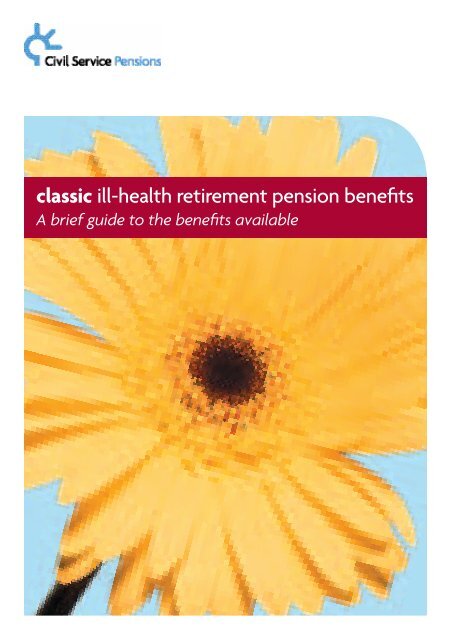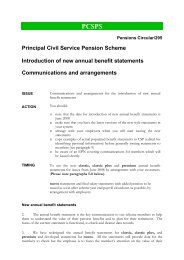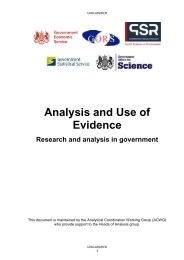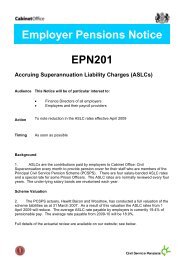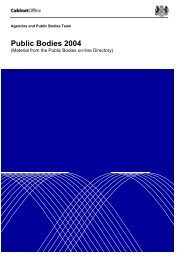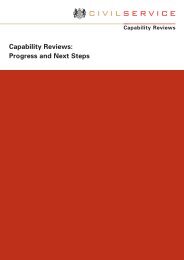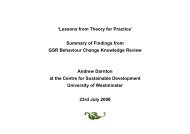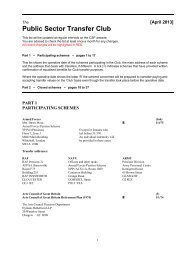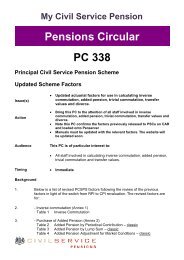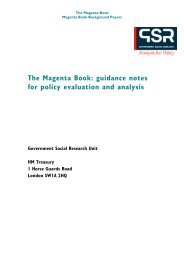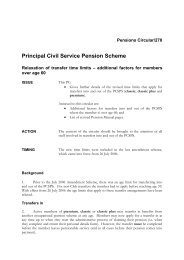classic ill-health retirement pension benefits - The Civil Service
classic ill-health retirement pension benefits - The Civil Service
classic ill-health retirement pension benefits - The Civil Service
Create successful ePaper yourself
Turn your PDF publications into a flip-book with our unique Google optimized e-Paper software.
<strong>classic</strong> <strong>ill</strong>-<strong>health</strong> <strong>retirement</strong> <strong>pension</strong> <strong>benefits</strong>A brief guide to the <strong>benefits</strong> available
Your questions answeredHow does the <strong>ill</strong>-<strong>health</strong><strong>retirement</strong> procedure work?You can ask for <strong>ill</strong>-<strong>health</strong> <strong>retirement</strong>.Alternatively, your employer may putyou forward. In both cases, the scheme’smedical adviser must be satisfied thatyou meet the <strong>ill</strong>-<strong>health</strong> <strong>retirement</strong>criteria. If they find that you do, youremployer w<strong>ill</strong> then decide whether toretire you.How are your <strong>benefits</strong>worked out?You w<strong>ill</strong> receive immediate paymentof your <strong>pension</strong> and lump sum. Your<strong>pension</strong> may be enhanced (that meansyou w<strong>ill</strong> receive added years of service).Your <strong>pension</strong> is worked out as 1/80thof your <strong>pension</strong>able earnings for everyyear of your completed reckonableservice.You also qualify for a tax-free lump sum.It is worked out as three times your<strong>pension</strong> and is payable immediately.You w<strong>ill</strong> also be able to choose to giveup part of your <strong>pension</strong> for an additionallump sum. You can choose how muchextra lump sum you want, up to amaximum of your <strong>pension</strong> x 33/14, butyou must give up £1 of annual <strong>pension</strong>for each £12 of lump sum.You can find out how much additionallump sum you can take, and the effectit w<strong>ill</strong> have on your <strong>pension</strong> by using theLump sum calculator on the <strong>Civil</strong> <strong>Service</strong>Pensions website (or you can ask yourMyCSP Pension <strong>Service</strong> Centre to do thisfor you if you do not have access to thecalculator).Reducing annual <strong>pension</strong> in this waygenerally has no impact on dependants’<strong>pension</strong>s as these are based on your<strong>pension</strong> before you give any up for ahigher lump sum. However, if you areaged 75 or over when you die, the taxrules on <strong>pension</strong>s w<strong>ill</strong> restrict the totalof any dependants’ <strong>pension</strong>s payableto a maximum of the amount of your<strong>pension</strong> at the date of your death.As taking a higher lump sum reducesyour <strong>pension</strong>, this might lead to yourdependants’ <strong>pension</strong>s being reduced ifyou die after reaching 75. But this is onlylikely to be an issue if you leave two or3
• Over ten years’ reckonable serviceYes. Your reckonable service isincreased under Method A or B,whichever gives the best result:Method AYour reckonable service is increasedto 20 years, or, if it is less, to theamount you would have built up ifyou had worked until five years after<strong>pension</strong> age.Method BYour reckonable service is increasedby 62/3 years, or, if it is less, to theamount you would have built up by<strong>pension</strong> age.Note: A sum may be deductedfrom your lump sum to cover thecontributions due on the widow’s,widower’s or surviving civil partner’s<strong>benefits</strong> for any enhanced period ofreckonable service. If you had alreadyopted to pay additional contributionsfor widow’s, widower’s or surviving civilpartner’s <strong>benefits</strong>, this deduction may bereduced or eliminated.<strong>benefits</strong> from your lump sum. Contactyour MyCSP Pension <strong>Service</strong> Centre forfurther information.Can I appeal against myemployer’s decision toretire me/not to retire me?Yes. <strong>The</strong>re is an appeals process you cango through. Your MyCSP Pension <strong>Service</strong>Centre can give you details.If any of your reckonable servicewas before 1 June 1972, you may havea further deduction for widow’s,widower’s or surviving civil partner’s5
Other informationWhat are the criteria for<strong>ill</strong>-<strong>health</strong> <strong>retirement</strong> <strong>benefits</strong>?<strong>The</strong> criteria are that you are preventedby <strong>ill</strong>-<strong>health</strong> from discharging your dutiesand that your <strong>ill</strong>-<strong>health</strong> is likely to bepermanent.• Prevented means having asignificant incapacity. It does notmean ‘unw<strong>ill</strong>ing’, ‘disinclined to’ or‘inconvenient to’ undertake duty.• Ill-<strong>health</strong> means a recognised medicalcondition giving rise to the incapacity.Diagnosis must be supported byclinical findings.• Discharging duties means providingregular and effective service in thenormal duties of the grade.• Likely means on a balance ofprobabilities.• Permanent means until normal<strong>retirement</strong> age for your job.Injury at workIf you retire as a result of an injurysustained, or a disease contracted, inthe course of official duty, additional<strong>benefits</strong> may be payable under the<strong>Civil</strong> <strong>Service</strong> Injury Benefit Scheme.You should contact your employer forfurther information.Pensions increaseYou w<strong>ill</strong> receive cost of living increaseson your <strong>ill</strong>-<strong>health</strong> <strong>retirement</strong> <strong>pension</strong>from the time it comes into payment,regardless of your age at the time youretire.For more information and advice aboutspecific <strong>benefits</strong>, please contact yourMyCSP Pension <strong>Service</strong> Centre.6
www.civilservice.gov.uk/<strong>pension</strong>sThis leaflet has been produced by MyCSPon behalf of the Cabinet Office.© Crown copyright December 2012Printed by St Ives Direct PBIHR


